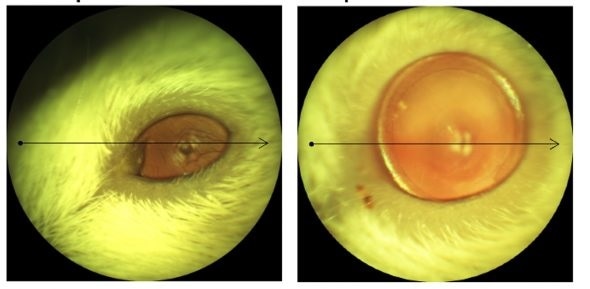A new study by researchers at the University of Illinois Chicago describes a potential technique of using drug repurposing for the treatment of genetic diseases.

Representative eye of a PAX6 deficient mouse after treatment (right) showing a better developed eye and clear cornea compared to a control treated PAX6 deficient mouse eye (left) showing a smaller eye with scarring and blood vessel growth. Image Credit: University of Illinois Chicago.
A research team from the UIC Department of Ophthalmology and Visual Sciences published the paper titled “Gene dosage manipulation alleviates manifestations of hereditary PAX6 haploinsufficiency in mice” in the Science Translational Medicine journal.
Almost all the genes in human DNA have two copies—one inherited from the father and the other one from the mother. In certain genetic diseases, only one copy of the genes is found to be normal and the other one is non-functional due to an error in the DNA.
According to Ali Djalilian, UIC professor of ophthalmology and corresponding author of the paper, the concept underlying this study was to verify whether it is possible to improve the normal copy to make up for the non-functional copy.
The team used a mouse model of aniridia, a human eye disorder that affects the iris and leads to considerable visual impairment, and can even cause systemic abnormalities.
Aniridia is caused when one copy of the gene PAX6 is normal, while the other one is non-functional. The PAX6 gene plays a crucial role in eye development, and patients suffering from aniridia and PAX6 deficiency exhibit congenital eye problems, which affect their vision and can progress through their entire life, added Djalilian.
The researchers analyzed drugs that can improve PAX6 and identified that a specific class of drugs called MEK inhibitors can trigger PAX6 expression in the eye. This drug was tested on newborn PAX6 deficient mice by the researchers.
They discovered that either oral or topical administration of the drug improved PAX6 and somewhat normalized their eye development. Mice treated using topical MEK inhibitor were found to have clearer corneas (less scarring) and had better vision.
Patients with aniridia can develop progressive loss of their corneal stem cells which is a challenging clinical problem. Our research in the Corneal Regenerative Medicine Laboratory is aimed at regenerating healthy corneal cells, which we hope can help these and similar patients.”
Mark Rosenblatt, Dean, College of Medicine, University of Illinois Chicago
Rosenblatt is also the co-author of this study.
More studies are certainly needed before this approach can be tested in human patients, nonetheless, the study opens the possibility of using approved medications in some genetic diseases to enhance the function of a normal copy of a gene to compensate for the non-functional copy.”
Ali Djalilian, Professor of Ophthalmology, University of Illinois Chicago
Source:
Journal reference:
Rabiee, B., et al. (2020) Gene dosage manipulation alleviates manifestations of hereditary PAX6 haploinsufficiency in mice. Science Translational Medicine. doi.org/10.1126/scitranslmed.aaz4894.